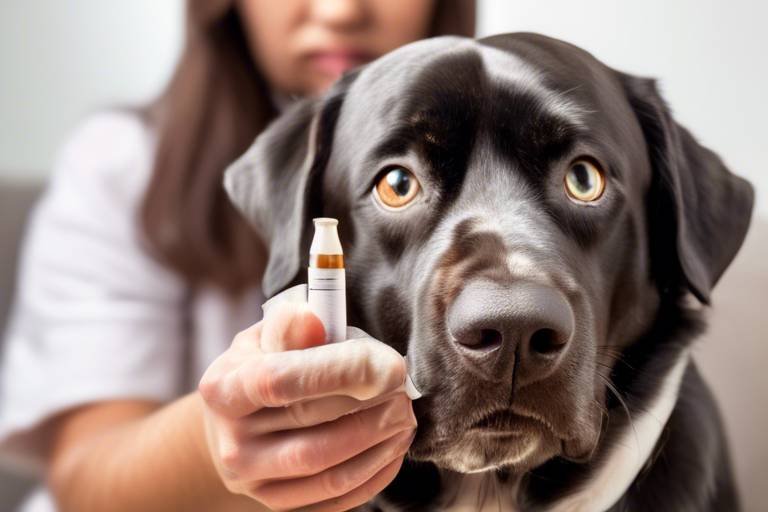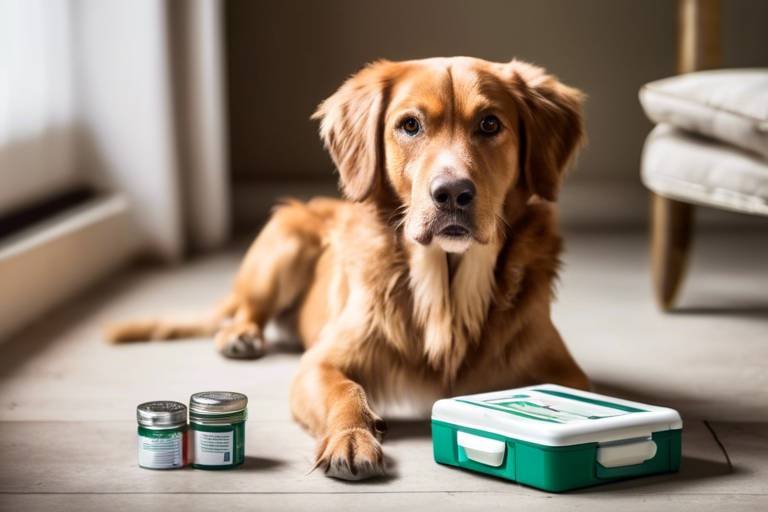What to Do If Your Pet Has an Allergic Reaction to Medication
As a pet owner, it can be downright terrifying to witness your furry friend experiencing an allergic reaction to medication. Just like humans, pets can have varying responses to different drugs, and sometimes those reactions can escalate quickly. So, what do you do when your beloved companion starts showing signs of distress? First and foremost, staying calm is essential. Panic can cloud your judgment and delay the help your pet needs. This article will guide you through the crucial steps to take when your pet has an allergic reaction, ensuring their safety and well-being during this emergency.
Understanding the signs of allergic reactions in pets is crucial. You might wonder, how do you even know if your pet is having an allergic reaction? Keep an eye out for common symptoms such as itching, swelling, vomiting, and difficulty breathing. These signs can manifest rapidly, making early detection vital. Think of it like catching a fire before it spreads; the sooner you act, the better the outcome. If you notice any of these symptoms, it’s time to take action!
If you suspect your pet is having an allergic reaction, the clock is ticking. The first step is to remove the medication if possible. This might mean taking away pills, stopping topical applications, or even flushing out an eye if that’s where the medication was administered. Next, you should contact your veterinarian or an emergency animal clinic for immediate advice and treatment. Don’t hesitate; every second counts when it comes to your pet’s health!
Not all allergic reactions are the same. Some may be mild, while others can be life-threatening. Knowing how to assess the severity of symptoms is vital for making informed decisions. For instance, minor reactions may include localized itching or rashes. While these can be uncomfortable, they often require less urgent care and can sometimes be managed at home. However, severe allergic reactions, such as anaphylaxis, require immediate veterinary intervention. Symptoms like difficulty breathing or swelling of the face should prompt an urgent trip to the vet. Understanding the difference could save your pet's life!
Minor allergic reactions can often be identified by symptoms such as:
- Localized itching or rash
- Redness of the skin
- Excessive licking of a specific area
While these symptoms can be bothersome for your pet, they may not require immediate veterinary attention. However, it's always a good idea to consult your vet for advice on managing these symptoms effectively.
On the flip side, severe allergic reactions can manifest in alarming ways, such as:
- Difficulty breathing or wheezing
- Swelling of the face, lips, or tongue
- Rapid heartbeat or collapse
These symptoms are red flags that demand immediate veterinary care. Remember, when it comes to severe reactions, it’s always better to be safe than sorry!
For mild reactions, certain home remedies may help alleviate symptoms. However, always consult with your veterinarian before trying any home treatment to ensure it's safe for your pet. Some potential remedies include:
- Applying cool compresses to itchy areas
- Using oatmeal baths to soothe the skin
- Administering antihistamines, but only if prescribed by your vet
These remedies can provide comfort, but they are not substitutes for professional care.
Preventing allergic reactions involves careful monitoring of your pet's medications and health history. Discuss potential allergies with your veterinarian to choose the safest options for your pet. Keeping a detailed record of your pet's reactions can help identify specific allergens. This information is crucial for your veterinarian to tailor a safe treatment plan. Think of it as creating a personalized health map for your furry friend!
Keeping track of what your pet has been exposed to can be incredibly beneficial. You might want to maintain a journal or digital log that includes:
- The names of medications
- Dates of administration
- Any observed reactions
This record can be invaluable for your vet in determining safe treatment options moving forward.
If your pet has a known allergy, your veterinarian can recommend alternative medications that are less likely to trigger an allergic response. This ensures your pet receives the necessary treatment safely. Always communicate openly with your vet about any past reactions to medications, as this will help them make informed decisions about your pet's care.
Q: How can I tell if my pet is having an allergic reaction?
A: Look for signs such as itching, swelling, vomiting, or difficulty breathing. If you notice any of these symptoms, contact your veterinarian immediately.
Q: What should I do if my pet has a mild allergic reaction?
A: For mild reactions, you can try home remedies like cool compresses or oatmeal baths, but always consult your veterinarian for advice.
Q: Are there medications that are safer for pets with known allergies?
A: Yes! Your veterinarian can recommend alternative medications that are less likely to cause allergic reactions.
Q: How can I prevent future allergic reactions in my pet?
A: Keep a detailed record of your pet's reactions and discuss potential allergies with your veterinarian to choose safe medication options.

Recognizing Allergic Reactions
This article provides essential guidance for pet owners on identifying and managing allergic reactions to medications in pets, ensuring their safety and well-being during such emergencies.
Understanding the signs of allergic reactions in pets is crucial for their health and safety. Just like humans, pets can have various reactions to medications that can range from mild to severe. It's important to be vigilant and recognize the symptoms early on. Common signs of an allergic reaction include:
- Itching and Scratching: If your pet is constantly scratching or biting at their skin, it could be a sign of an allergic reaction.
- Swelling: Look for swelling around the face, ears, or paws. This can indicate a more serious reaction.
- Vomiting: If your pet suddenly vomits after taking medication, it may be a sign of an allergy.
- Difficulty Breathing: This is one of the most alarming symptoms. If your pet is struggling to breathe, it requires immediate attention.
Other symptoms may include excessive drooling, diarrhea, or even behavioral changes such as lethargy or irritability. Early detection can significantly improve outcomes and reduce complications. Always trust your instincts—if you feel something is off with your pet after administering medication, it’s best to err on the side of caution and consult your veterinarian.
If you suspect your pet is having an allergic reaction, act quickly. Remove the medication if possible, and contact your veterinarian or an emergency animal clinic for immediate advice and treatment.
Not all allergic reactions are the same. Some may be mild, while others can be life-threatening. Knowing how to assess the severity of symptoms is vital for making informed decisions.
Minor allergic reactions may include localized itching or rashes. While these can be uncomfortable, they often require less urgent care and can sometimes be managed at home.
Severe allergic reactions, such as anaphylaxis, require immediate veterinary intervention. Symptoms like difficulty breathing or swelling of the face should prompt an urgent trip to the vet.
For mild reactions, certain home remedies may help alleviate symptoms. However, always consult with your veterinarian before trying any home treatment to ensure it's safe for your pet.
Preventing allergic reactions involves careful monitoring of your pet's medications and health history. Discuss potential allergies with your veterinarian to choose the safest options for your pet.
Keeping a detailed record of your pet's reactions can help identify specific allergens. This information is crucial for your veterinarian to tailor a safe treatment plan.
If your pet has a known allergy, your veterinarian can recommend alternative medications that are less likely to trigger an allergic response, ensuring your pet receives the necessary treatment safely.
Q: How can I tell if my pet is having an allergic reaction?
A: Look for signs like itching, swelling, vomiting, or difficulty breathing. If you notice any of these symptoms after administering medication, contact your veterinarian immediately.
Q: Are certain pets more prone to allergic reactions?
A: Yes, some breeds may be more susceptible to allergies. Always consult with your vet about your pet's specific health risks.
Q: What should I do if my pet has a severe reaction?
A: If your pet is experiencing severe symptoms like difficulty breathing or swelling, seek emergency veterinary care immediately.
Q: Can I use over-the-counter medications for my pet?
A: Never give your pet over-the-counter medications without consulting your veterinarian, as some human medications can be toxic to animals.

Immediate Steps to Take
If you suspect your furry friend is having an allergic reaction, it's crucial to act quickly and calmly. Imagine your pet as a little ticking time bomb; the sooner you diffuse the situation, the better the outcome. First and foremost, if you can safely remove the medication from your pet's reach, do so immediately. This is akin to stopping a leaking faucet before it floods the bathroom—every second counts! Once the medication is out of the picture, your next step is to contact your veterinarian or an emergency animal clinic without delay. They are the experts who can guide you through the next steps and provide immediate care if necessary.
When you call, be prepared to provide specific details about the situation. This includes the name of the medication, the dosage your pet received, and the symptoms you are observing. This information will help the veterinary staff assess the situation and determine the best course of action. It’s like giving them a roadmap to navigate through the emergency. In case you can't reach your regular vet, look for a nearby emergency animal clinic—it's essential to have a backup plan!
While waiting for professional help, keep a close eye on your pet’s condition. If symptoms worsen, such as increased difficulty in breathing or swelling, don’t hesitate to rush to the nearest veterinary clinic. Remember, some signs of allergic reactions can escalate quickly, and time is of the essence. In such scenarios, having a pet first-aid kit handy can be a lifesaver. This kit could include items like antihistamines (only those approved by your vet), sterile gauze, and a pet-safe thermometer.
In addition, make sure to have your pet’s medical history available. This can include previous allergic reactions or sensitivities, as well as any other medications they may be taking. This information will help the vet make informed decisions about the treatment. Think of it as providing them with a complete puzzle instead of just a few scattered pieces.
After the immediate situation is under control, it’s important to follow up with your veterinarian to discuss the incident. They may recommend allergy testing or a change in medication to prevent future reactions. Remember, just like humans, pets can have unique reactions to different substances, so understanding your pet’s specific needs is vital for their health and happiness.
- What should I do if my pet has a mild allergic reaction?
If your pet exhibits mild symptoms like itching or localized rashes, you can monitor them closely and consult your veterinarian for advice. They may recommend over-the-counter remedies that are safe for pets. - How can I tell if my pet's reaction is severe?
Signs of a severe allergic reaction include difficulty breathing, swelling of the face or throat, or collapse. If you observe any of these symptoms, seek emergency veterinary care immediately. - Can I give my pet human medications for allergies?
Never give your pet human medications without consulting your veterinarian first. Some human medications can be toxic to pets and may worsen their condition. - What are the long-term solutions for preventing allergic reactions?
Work closely with your veterinarian to identify potential allergens and consider allergy testing. Keeping a detailed record of your pet's reactions can also help tailor a safe treatment plan.
Assessing Severity of Symptoms
When it comes to recognizing allergic reactions in our beloved pets, it’s crucial to understand that not all symptoms are created equal. Some reactions can be as mild as a slight itch or a small rash, while others can escalate into life-threatening emergencies. Think of it like a spectrum—on one end, you have minor annoyances, and on the other, you have situations that require immediate action. Knowing how to assess the severity of your pet's symptoms can be the difference between a simple home remedy and a frantic dash to the vet.
To make it easier for pet owners, let’s break down the symptoms into two main categories: minor reactions and severe reactions. Understanding these categories can help you respond appropriately:
| Symptom Type | Description | Action Required |
|---|---|---|
| Minor Reactions | Localized itching, mild rashes, or slight swelling | Monitor at home; consult a vet if symptoms persist |
| Severe Reactions | Difficulty breathing, swelling of the face, or vomiting | Seek immediate veterinary care |
For instance, if your pet starts scratching at a particular spot or develops a small rash, it might just be a minor reaction. You can try to soothe the area with a cool compress or an oatmeal bath, but keep a close eye on them. If the itching persists or worsens, a call to your veterinarian is warranted.
On the flip side, if you notice your furry friend struggling to breathe or if their face starts to swell like a balloon, don’t hesitate—grab your keys and head to the vet immediately! These symptoms can indicate a severe allergic reaction, such as anaphylaxis, which can be fatal without prompt treatment.
In summary, assessing the severity of your pet's allergic reactions is all about staying vigilant and informed. Keep an eye out for changes in behavior or physical symptoms, and don’t hesitate to reach out to a professional when in doubt. Your pet relies on you to be their advocate, so trust your instincts and act accordingly!
- What should I do if my pet has a mild allergic reaction?
If your pet exhibits mild symptoms, monitor them closely and consider consulting your veterinarian for guidance on home treatment options.
- How can I tell if my pet's reaction is severe?
Look for symptoms like difficulty breathing, swelling of the face, or persistent vomiting. If you notice these signs, seek immediate veterinary attention.
- Are there any common allergens in pet medications?
Yes, common allergens can include certain antibiotics, non-steroidal anti-inflammatory drugs (NSAIDs), and even vaccines. Always discuss your pet's medical history with your vet.
- Can I give my pet over-the-counter antihistamines?
Some over-the-counter antihistamines can be safe for pets, but always consult your veterinarian for the correct dosage and suitability for your pet.
Minor Reactions
When it comes to our furry friends, even minor allergic reactions can be concerning. These reactions can manifest in various ways, and it’s essential for pet owners to recognize them early. Localized itching is one of the most common signs. You might notice your pet scratching a specific area or licking excessively. This behavior can be frustrating for both you and your pet, as it can lead to further irritation or even skin infections if left unchecked.
Another symptom to watch for is rashes or hives. These can appear as small, raised bumps on your pet's skin, often accompanied by redness. While they may not seem severe, they can cause discomfort and should not be ignored. If you notice these symptoms, it’s a good idea to check for any recent changes in your pet's diet, environment, or medication. Sometimes, even a new type of food or a change in laundry detergent can trigger these responses.
In many cases, minor reactions can be managed at home. However, it’s crucial to keep a close eye on your pet. If you see signs of swelling or if the itching becomes unbearable, you might want to consider consulting your veterinarian. They can provide guidance on whether over-the-counter treatments, such as antihistamines, are appropriate for your pet. Always remember that what works for humans may not be safe for pets, so never give your pet any medication without veterinary approval.
To help you better understand minor allergic reactions, here's a quick overview:
| Symptom | Description | Recommended Action |
|---|---|---|
| Localized Itching | Scratching or licking a specific area | Monitor and consult a vet if it persists |
| Rashes or Hives | Small, raised bumps or redness on the skin | Keep an eye on the rash; consult a vet if it worsens |
| Gastrointestinal Upset | Vomiting or diarrhea | Withhold food for a few hours; consult a vet if severe |
Ultimately, the key to managing minor allergic reactions lies in your observation and response. Keeping a close watch on your pet's behavior and symptoms can make a significant difference. If you ever feel uncertain about your pet's condition, it’s always best to err on the side of caution and reach out to your veterinarian. They are your best resource for ensuring your pet stays healthy and happy.
- What should I do if my pet is scratching excessively? If your pet is scratching a lot, check for signs of irritation or rash. You can apply a cool compress to the area to soothe it, but consult your vet if it continues.
- Are there any home remedies for minor allergic reactions? Some owners find that oatmeal baths can help soothe itchy skin. However, always consult your vet before trying any home remedies.
- How can I prevent my pet from having allergic reactions? Keeping a detailed record of your pet's diet and any medications can help identify potential allergens. Regular check-ups with your vet can also aid in prevention.
Severe Reactions
This article provides essential guidance for pet owners on identifying and managing allergic reactions to medications in pets, ensuring their safety and well-being during such emergencies.
Understanding the signs of allergic reactions in pets is crucial. Common symptoms include itching, swelling, vomiting, and difficulty breathing. Early detection can significantly improve outcomes and reduce complications.
If you suspect your pet is having an allergic reaction, act quickly. Remove the medication if possible, and contact your veterinarian or an emergency animal clinic for immediate advice and treatment.
Not all allergic reactions are the same. Some may be mild, while others can be life-threatening. Knowing how to assess the severity of symptoms is vital for making informed decisions.
Minor allergic reactions may include localized itching or rashes. While these can be uncomfortable, they often require less urgent care and can sometimes be managed at home.
When it comes to allergic reactions, severe cases can be downright terrifying. Imagine your beloved pet struggling to breathe or their face swelling up like a balloon! These symptoms can indicate a life-threatening condition known as anaphylaxis. Anaphylaxis can occur within minutes of exposure to an allergen, and it demands immediate veterinary attention. The most common signs of severe reactions include:
- Difficulty Breathing: If your pet is wheezing, gasping for air, or has an unusually high respiratory rate, it’s a sign of distress.
- Swelling: Pay close attention to swelling around the face, eyes, or throat. This can obstruct airways and is a critical situation.
- Vomiting or Diarrhea: While these symptoms can occur in minor reactions, in severe cases, they may lead to dehydration and shock.
- Collapse: If your pet suddenly becomes weak or collapses, this is an emergency. It could indicate shock or severe distress.
In such situations, time is of the essence. If you notice any of these symptoms, do not hesitate to rush your pet to the nearest veterinary clinic or emergency animal hospital. Remember, your quick response could mean the difference between life and death for your furry friend.
For mild reactions, certain home remedies may help alleviate symptoms. However, always consult with your veterinarian before trying any home treatment to ensure it's safe for your pet.
Preventing allergic reactions involves careful monitoring of your pet's medications and health history. Discuss potential allergies with your veterinarian to choose the safest options for your pet.
Keeping a detailed record of your pet's reactions can help identify specific allergens. This information is crucial for your veterinarian to tailor a safe treatment plan.
If your pet has a known allergy, your veterinarian can recommend alternative medications that are less likely to trigger an allergic response, ensuring your pet receives the necessary treatment safely.
Q: What should I do if my pet has an allergic reaction?
A: If you suspect an allergic reaction, remove the medication if possible and contact your veterinarian or an emergency clinic immediately.
Q: How can I tell if my pet's reaction is severe?
A: Watch for signs like difficulty breathing, swelling, vomiting, or collapse. These symptoms require urgent veterinary care.
Q: Are there home remedies for mild allergic reactions?
A: Yes, some home remedies may help, but always consult your veterinarian before trying any treatments to ensure they are safe for your pet.
Q: How can I prevent future allergic reactions in my pet?
A: Keep a detailed record of your pet's medication history and discuss any known allergies with your veterinarian to choose safer medication options.
Home Remedies and Care
If your furry friend is experiencing a mild allergic reaction, there are several home remedies that may help alleviate their discomfort. However, it’s crucial to remember that these remedies are not substitutes for veterinary care, and you should always consult with your veterinarian before trying any home treatment. Think of it as a safety net; you wouldn’t jump without checking if the ground is safe, right?
One effective remedy for minor skin irritations is a cool bath. This can help soothe itchy skin and reduce inflammation. Use lukewarm water and consider adding a little baking soda to the bath, as it can help relieve itching. After the bath, gently pat your pet dry with a soft towel—no rubbing, please! Rubbing can irritate the skin further.
Another option is applying a cold compress to the affected area. Just take a clean cloth, soak it in cold water, and place it on the itchy spot for about 10-15 minutes. This can provide quick relief and help reduce swelling. If your pet is particularly anxious or agitated, consider creating a calm environment with soft music or a cozy blanket to help them relax.
In some cases, natural remedies like aloe vera gel can be applied to irritated skin. Aloe vera is known for its soothing properties and can help reduce redness and inflammation. Just make sure your pet doesn’t lick it off, as ingesting it can lead to other issues. If you’re unsure about what’s safe, always check with your vet first!
Here’s a quick reference table summarizing some common home remedies:
| Home Remedy | Purpose | Notes |
|---|---|---|
| Cool Bath | Soothes itchy skin | Add baking soda for extra relief |
| Cold Compress | Reduces swelling | Apply for 10-15 minutes |
| Aloe Vera Gel | Soothes irritated skin | Ensure pet doesn’t lick it off |
While these remedies can be helpful, always keep an eye on your pet's symptoms. If you notice any worsening or new symptoms, it’s time to reach out to your vet. Remember, your pet’s health is the top priority, and sometimes home remedies are just the first step in a larger treatment plan.
Q: How can I tell if my pet is having an allergic reaction?
A: Look for symptoms like itching, swelling, vomiting, or difficulty breathing. If you notice these signs, it’s crucial to act quickly.
Q: Are there any over-the-counter medications I can give my pet for allergic reactions?
A: It’s best to consult your veterinarian before giving any medication, as some human medications can be harmful to pets.
Q: Can I use human allergy medications on my pet?
A: No, many human medications can be toxic to pets. Always seek veterinary advice before administering any medication.
Q: What should I do if my pet has a severe allergic reaction?
A: Seek immediate veterinary care. Severe reactions can be life-threatening and require prompt treatment.
Q: How can I prevent allergic reactions in the future?
A: Keep a detailed record of your pet’s medications and any reactions they have. Discuss potential allergies with your veterinarian to choose safer options.

Preventing Future Reactions
Preventing allergic reactions in your beloved pet is a proactive approach that every responsible pet owner should take. It’s not just about reacting to a problem; it’s about ensuring that your furry friend stays safe and healthy in the long run. One of the first steps in this journey is to maintain a comprehensive record of your pet's medications, health history, and any previous allergic reactions. This documentation can serve as a vital resource for you and your veterinarian when making decisions about future treatments.
Additionally, it's essential to have an open dialogue with your vet regarding any known allergies your pet may have. This conversation can help you both identify potential risks associated with certain medications or treatments. For instance, if your dog has had a bad reaction to a specific antibiotic in the past, your vet can steer you toward safer alternatives. Remember, your veterinarian is your partner in ensuring your pet’s health, so don't hesitate to ask questions!
Another effective strategy is to monitor your pet closely after administering any new medication. Just like humans, pets can react differently to drugs, and sometimes these reactions can be delayed. Keep an eye out for any unusual behaviors or symptoms in the days following a new treatment. Being vigilant can make a world of difference when it comes to catching a potential allergic reaction early.
Furthermore, consider creating a medication checklist for your pet. This checklist should include details such as:
- Medication name
- Dosage and frequency
- Start and end dates of treatment
- Any observed side effects or reactions
Having this information readily available can help you and your vet make informed decisions about future treatments and avoid repeating any mistakes. Remember, knowledge is power!
Lastly, consider discussing alternative medications with your veterinarian if your pet has a history of allergies. There are often multiple options available for treating various conditions, and your vet can recommend alternatives that are less likely to cause allergic reactions. This way, you can be proactive in safeguarding your pet's health while ensuring they receive the necessary care.
Q: How can I tell if my pet is having an allergic reaction to medication?
A: Look for symptoms like itching, swelling, vomiting, or difficulty breathing. If you notice any of these signs, contact your veterinarian immediately.
Q: What should I do if my pet has an allergic reaction?
A: Remove the medication if possible and contact your veterinarian or an emergency animal clinic right away for guidance.
Q: Can I use home remedies for mild allergic reactions?
A: While some home remedies may help, it’s crucial to consult your veterinarian before trying any treatment to ensure it’s safe for your pet.
Q: How can I prevent future allergic reactions?
A: Keep a detailed record of your pet’s medications and health history, and discuss any known allergies with your veterinarian to choose safer treatment options.
Identifying Allergens
Identifying allergens in your pet's environment and diet is crucial for preventing future allergic reactions. Just like how we sometimes experience unexpected reactions to certain foods or environmental factors, our furry friends can have similar sensitivities. It’s essential to become a detective when it comes to your pet’s health. Start by keeping a detailed journal of any reactions your pet has experienced, noting the medications, foods, or environmental changes that occurred before the symptoms appeared. This will help you and your veterinarian pinpoint potential allergens.
When documenting your pet's reactions, consider including the following details:
- Date and time of the reaction
- Type of medication or food administered
- Symptoms observed (e.g., itching, swelling, vomiting)
- Duration of symptoms
- Any other changes in the environment (new cleaning products, plants, etc.)
Once you have gathered this information, share it with your veterinarian. They can use this data to help identify specific allergens and tailor a treatment plan that minimizes exposure. Remember, some pets may react to common allergens such as pollen, dust mites, or specific ingredients in their food. Identifying these triggers is a bit like solving a puzzle, and every piece of information you provide can help complete the picture.
In addition to keeping a journal, consider conducting a thorough review of your pet’s diet and lifestyle. Sometimes, switching to a hypoallergenic diet or using specific cleaning products can make a world of difference. Your veterinarian may also recommend allergy testing, which can provide more targeted insights into what your pet might be allergic to. This proactive approach not only protects your pet from future reactions but also gives you peace of mind as a pet owner.
- What should I do if I suspect my pet has an allergy? Contact your veterinarian immediately for guidance.
- Can I give my pet over-the-counter antihistamines? Always consult your veterinarian before administering any medication.
- How can I prevent allergic reactions in my pet? Monitor your pet's diet and environment, and discuss potential allergens with your vet.
- Are some breeds more prone to allergies? Yes, certain breeds may have genetic predispositions to allergies.
Alternative Medications
When your furry friend has a known allergy to certain medications, it can feel like navigating a minefield. The good news is that there are often available that can provide the necessary treatment without triggering an allergic response. Your veterinarian is your best ally in this journey, as they can recommend safe substitutes based on your pet's specific health needs and history.
Before diving into alternatives, it's crucial to have a conversation with your vet about your pet's allergies. They can help you create a comprehensive medication plan that minimizes risks. For instance, if your pet is allergic to a particular class of antibiotics, your vet might suggest different options that belong to another class, which can be just as effective in treating infections without the associated risks.
Here are some common categories of alternative medications that might be considered:
- Antihistamines: These can be helpful for managing mild allergic reactions and can provide relief from symptoms like itching and swelling.
- Topical Treatments: Creams and ointments can target localized reactions and provide soothing relief without the need for systemic medications.
- Natural Remedies: Some pet owners find success with natural supplements, such as omega-3 fatty acids or probiotics, which can help support overall health and reduce allergic responses.
It's essential to remember that not all alternatives are suitable for every pet. Factors such as breed, age, and existing health conditions play a significant role in determining the best course of action. Therefore, always consult with your veterinarian before introducing any new medication or treatment.
In some cases, your vet might also consider desensitization therapy, which involves gradually exposing your pet to small amounts of the allergen to build tolerance over time. This approach requires a lot of patience and close monitoring but can be a game-changer for pets with severe allergies.
Ultimately, keeping an open line of communication with your veterinarian and being proactive about your pet's health can make a world of difference. By working together, you can find the safest and most effective treatment options for your beloved companion.
Q: How do I know if my pet is allergic to a medication?
A: Signs of an allergic reaction can vary but often include itching, swelling, vomiting, or difficulty breathing. If you notice any of these symptoms after administering medication, contact your veterinarian immediately.
Q: Can I give my pet over-the-counter antihistamines?
A: Some over-the-counter antihistamines can be safe for pets, but it's crucial to consult your veterinarian before administering any medication to ensure it's appropriate for your pet's specific situation.
Q: What should I do if my pet has a severe allergic reaction?
A: If your pet shows signs of a severe allergic reaction, such as difficulty breathing or facial swelling, seek emergency veterinary care immediately. Time is critical in these situations.
Q: How can I prevent allergic reactions in my pet?
A: Keeping a detailed record of your pet's medication history and any known allergies can help your veterinarian choose safer alternatives. Regular check-ups can also help monitor your pet's health and address any potential issues before they escalate.
Frequently Asked Questions
- What are the common signs of an allergic reaction in pets?
Common signs of an allergic reaction in pets include itching, swelling, vomiting, and difficulty breathing. If you notice any of these symptoms after administering medication, it's crucial to act quickly.
- What should I do if I suspect my pet is having an allergic reaction?
If you suspect your pet is having an allergic reaction, the first step is to remove the medication if possible. Then, contact your veterinarian or an emergency animal clinic for immediate advice and treatment.
- How can I assess the severity of my pet's allergic reaction?
Assessing the severity involves observing the symptoms closely. Minor reactions may only cause localized itching or rashes, while severe reactions like anaphylaxis can lead to life-threatening symptoms such as difficulty breathing or facial swelling. If in doubt, seek veterinary help right away.
- Are there home remedies for mild allergic reactions in pets?
For mild allergic reactions, some home remedies might help alleviate symptoms, but it's essential to consult your veterinarian before trying any treatment. They can provide guidance on safe options for your pet.
- How can I prevent future allergic reactions in my pet?
Preventing future allergic reactions involves careful monitoring of your pet's medications and health history. Discuss potential allergies with your veterinarian to choose the safest options for your pet.
- What should I do if I identify a specific allergen for my pet?
If you identify a specific allergen, keep a detailed record of your pet's reactions. This information is crucial for your veterinarian to tailor a safe treatment plan and recommend alternative medications that are less likely to trigger an allergic response.



















